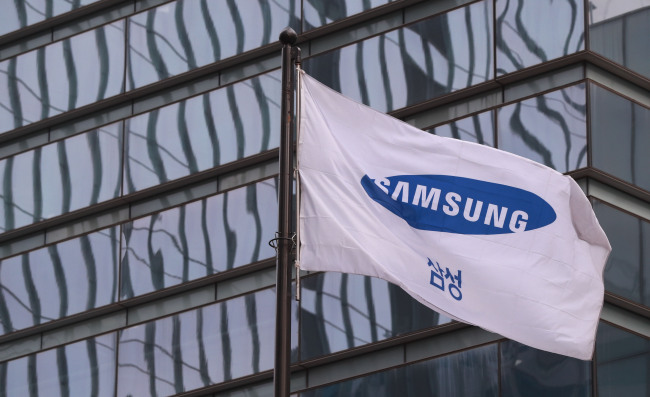[Newsmaker] What’s behind Samsung’s massive share split plan?
Aside from obvious benefits, experts say latest move allows peak into tech giant‘s management strategy
By Cho Chung-unPublished : Jan. 31, 2018 - 16:18
On the same day of announcing a record operating profit of 53 trillion won ($49.6 billion) for last year, South Korean tech giant Samsung Electronics surprised the market on Wednesday by unveiling the first-ever share split plan aimed at “enhancing shareholder value.”
The landmark decision by the company’s board was widely welcomed by the market, causing the share price to surge as high as 8 percent in the morning.
The plan will make Samsung Electronics “more accessible” for investors and provide dividends to a “wider range of investors” from 2018, the firm explained.
It is also expected to add both liquidity and marketability to the company’s stock, contributing to enhancing corporate value in the long term, the company added.
Other than Samsung’s rationale, experts said the decision has somewhat exposed the company’s management strategy, or what it had been concerned about.
Pointing out the percentage of foreign ownership -- 52 percent -- the decision was likely made to disperse the growing power, or the voice, by some specific investors with a large sum of shares, such as Elliott.
The landmark decision by the company’s board was widely welcomed by the market, causing the share price to surge as high as 8 percent in the morning.
The plan will make Samsung Electronics “more accessible” for investors and provide dividends to a “wider range of investors” from 2018, the firm explained.
It is also expected to add both liquidity and marketability to the company’s stock, contributing to enhancing corporate value in the long term, the company added.
Other than Samsung’s rationale, experts said the decision has somewhat exposed the company’s management strategy, or what it had been concerned about.
Pointing out the percentage of foreign ownership -- 52 percent -- the decision was likely made to disperse the growing power, or the voice, by some specific investors with a large sum of shares, such as Elliott.

“Samsung Electronics’ shares have been too expensive for individual investors to buy, making it only accessible for a limited group of investors such as hedge funds overseas,” said Park Ju-gun, founder and president of CEOScore, a local corporate tracker.
“By splitting shares, and making it more accessible to as many as possible, it could prevent some specific group from raising voices and tell Samsung what to do. So, in respect of protecting its management right, the decision could effectively block possible intervention for a while,” he said.
The decision has given a peak into Samsung’s management direction, according to Doh Hyun-woo, an analyst at NH Research Center.
Rumors have circulated that Samsung has decided to play aggressive and focus on increasing market competitiveness” rather than “profits,” as it invests heavily in DRAM compared to last year.
The share split decision reflects how Samsung is determined to further raise its stock value. Samsung is likely to expand shareholder-friendly programs and in order to do that it should keep its profit high, he said in his report.
But does the decision have anything to do with Samsung’s transition scenario or a verdict scheduled next Monday for the tech giant’s heir who has already spent a year in jail?
Experts, even chaebol critics, disagreed, saying that linking such shareholder-friendly plans with the timing of Lee Jae-yong’s fate at the court on Feb. 5 is absurd.
“It is not right to exaggerate on the motives of Samsung’s plan, but we need to keep an eye on Samsung’s (transition plan) in the future,” said Chung Sun-sup, CEO of Chaebul.com, another corporate tracker in Seoul.
“Nominal value of Samsung C&T is 100 won and if splitting Samsung Electronics share 50-to-1, its nominal value also becomes 100 won, as well,” he said.
Samsung Electronics Vice Chairman Lee Jae-yong holds 17.08 percent in Samsung C&T, which holds 4.8 percent of shares in Samsung Electronics.
By Cho Chung-un (christory@heraldcorp.com)





![[From the Scene] Monks, Buddhists hail return of remains of Buddhas](http://res.heraldm.com/phpwas/restmb_idxmake.php?idx=644&simg=/content/image/2024/04/19/20240419050617_0.jpg&u=20240419175937)




![[Graphic News] French bulldog most popular breed in US, Maltese most popular in Korea](http://res.heraldm.com/phpwas/restmb_idxmake.php?idx=644&simg=/content/image/2024/04/18/20240418050864_0.gif&u=)




![[From the Scene] Monks, Buddhists hail return of remains of Buddhas](http://res.heraldm.com/phpwas/restmb_idxmake.php?idx=652&simg=/content/image/2024/04/19/20240419050617_0.jpg&u=20240419175937)

![[KH Explains] Hyundai's full hybrid edge to pay off amid slow transition to pure EVs](http://res.heraldm.com/phpwas/restmb_idxmake.php?idx=652&simg=/content/image/2024/04/18/20240418050645_0.jpg&u=20240419100350)

![[Today’s K-pop] Illit drops debut single remix](http://res.heraldm.com/phpwas/restmb_idxmake.php?idx=642&simg=/content/image/2024/04/19/20240419050612_0.jpg&u=)